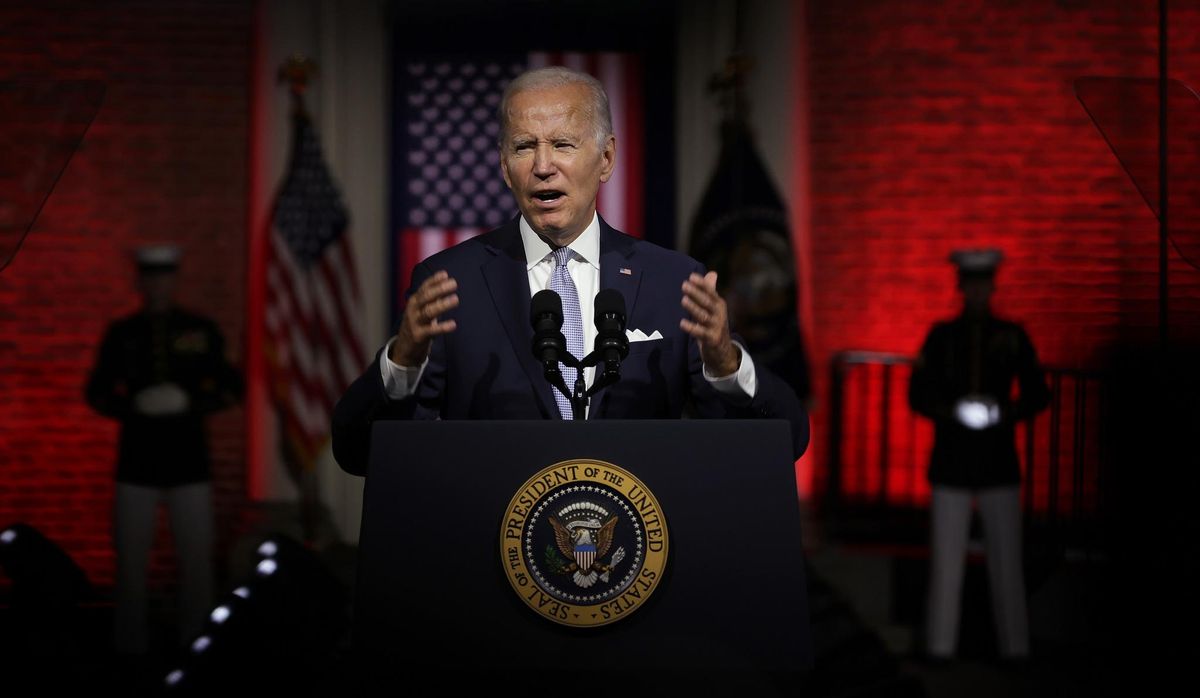Joe Biden ran for president in 2020 as the unifier of a broken nation.
After four years of partisan rancor and chaos under Donald Trump, Americans elected him to lower the temperature and heal rifts inside what has become the most politically divided and dysfunctional of all major economies. In his inaugural speech, President Biden vowed to put an end to “the uncivil war that pits red versus blue.”
Things have changed. Two weeks ago, Biden called out Trump and his supporters as “semi-fascists.” Then, last Thursday, the president spent the bulk of his prime-time address about democracy at Independence Hall in Philadelphia vigorously denouncing those he labeled ‘MAGA Republicans’ as a threat to the republic.
Want to understand the world a little better? Subscribe to GZERO Daily by Ian Bremmer for free and get new posts delivered to your inbox every week.
“The Republican Party today is dominated, driven, and intimidated by Donald Trump and the MAGA Republicans, and that is a threat to this country,” he said. “MAGA Republicans do not respect the Constitution. They do not believe in the rule of law. They do not recognize the will of the people.”
Why did Biden suddenly change his tune? After all, Trump is still the same man he was two years ago. The MAGA movement hasn’t changed, either. The threat is no different today than it was when Biden was inaugurated.
The clearest explanation is that he sees a short-term political opportunity.
Trump had been sinking a bit in the polls for the last few months. Most Republicans still liked him but weren’t as excited about him as before, and they were starting to consider other potential leaders like Florida Gov. Ron DeSantis. The January 6 hearings got a lot of play with Democrats, but Fox News barely covered it and Trump supporters didn’t pay much attention to them. This was all bad news for Democrats, who need Trump to fire up their base and draw moderate voters away from the Republican Party.
Enter the FBI search of Mar-a-Lago. Trump was thrust back into the news cycle. His supporters rallied against the FBI and the Justice Department for what they saw as yet another witch hunt. Suddenly, Republican officials and candidates were forced to make a choice: either distance themselves from Trump or embrace him.
Biden’s strategy is to make hedging on this choice harder for them as the midterms near. Given that most Americans prefer moderate and centrist candidates, going full MAGA makes Republicans easier to beat in November. But if they take the Liz Cheney route instead, they risk losing their GOP primary bids to Trumpier candidates—who in turn would face longer odds of winning general elections. Either way, Democrats stand to benefit from sharpening the stakes.Indeed, this gambit may well be the Democrats’ best chance of holding the Senate and minimizing their loss in the House.
Yes, the Biden administration has notched meaningful policy wins like the misnamed Inflation Reduction Act, the CHIPS Act, and student debt forgiveness that they can run on. Gas prices have come down from their highs, and the job market remains strong. The Supreme Court’s decision to overturnRoe v. Wade has energized Democratic voters and turned more than a few independents and suburban women off the GOP. But inflation is still very high, the average American is deeply worried about where the economy is headed, and Biden’s approval ratings are quite low. These fundamentals would normally spell trouble for the incumbent’s party.
By beating the drums against MAGA Republicans from the bully pulpit and making the midterms a referendum not on Biden’s tenure but on Trump, Democrats are keeping themselves in the race.
The downside of this strategy is that it will probably lead to more election deniers in office and strengthen Trump’s hold over the Republican Party, setting up a Biden vs. Trump contest in 2024. While Trump is more likely to lose to Biden than any other conceivable Republican nominee, he could win fair and square. Given how unfit for office he proved to be the last time around, the prospect of a second Trump presidency is extremely dangerous for the country.
And that’s not the worst of it. Should Trump lose, his efforts to overturn the election would be much more likely to succeed if there were more election-denying governors, state senators, secretaries of state, and attorneys general to aid him. This is a graver threat to U.S. institutions than a Trump victory.
Biden’s gamble may be a winner for the Democrats but a loser for America.
🔔 And if you haven't already, don't forget to subscribe to my free newsletter, GZERO Daily by Ian Bremmer, to get new posts delivered to your inbox.

